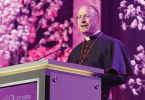
by Joe Bollig
joe.bollig@theleaven.org
KANSAS CITY, Kan. — Occasionally, when news is reported about the Vatican bureaucracy, you’ll read or hear the term “the Roman Curia.”
The word “curia” is ancient. It means “court,” and originally referred to the Roman senate — first of the Roman Republic, and later the Rome of the Caesars. Later, it was applied to the papal court.
The Vatican has a curia and so does the Archdiocese of Kansas City in Kansas. It also has someone who coordinates the curia, a moderator.
Father Mark Mertes, pastor of St. Patrick Parish in Kansas City, Kansas, was appointed moderator of the curia on July 1. He succeeded Father Gary Pennings, who served in that position for 13 years.
Father Mertes is also a member of the archbishop’s administrative team.
“The moderator of the curia helps the bishop guide the work of the many and diverse ministries of the archdiocese,” said Archbishop Joseph F. Naumann. “[He] provides guidance and support to the leaders of the church’s educational, pastoral, charitable and administrative ministries.”

Despite the ancient lineage of the curia, the position of moderator of the curia was established in 1983, with the revision of the Code of Canon Law. What the curia is, and the roles within it, are in canons 469 to 474.
The archdiocese has eight “divisions” in its administrative structure, and Father Mertes oversees three of them: Charity & Advocacy; Evangelization; and Family & Child Formation. Fathers John Riley, Brian Schieber and Joseph Arsenault, SSA, oversee the other divisions.
The moderator of the curia doesn’t have power like that of a vicar general, but does have responsibility and influence, said Father Mertes. Fundamentally, he is a facilitator.
The archbishop gets a lot of input and advice from members of different bodies: the archdiocesan pastoral council, archdiocesan finance council, presbyteral (priests) council, Envisioning Team and administrative team.
“That’s what synodality is, to listen to people to see what their concerns and needs are, and to bring the light of faith to what people have brought up,” he said.
“The moderator of the curia helps the archbishop do that — to help facilitate the ideas and concerns and hopes of the faithful, and of the ministries of the archdiocese,” he continued. “The moderator helps bring those to the attention of the archbishop through those various [entities], and similarly helps the archbishop communicate to those various groups, committees and councils what are priorities of the archbishop.”
Given all the demands on the archbishop, the help offered by the moderator of the curia is essential.
“It is a great help to me because it makes it possible for me to effectively guide the work of the many and varied ministries and apostolates of the archdiocese,” said Archbishop Naumann. “The moderator of the curia also helps advise me on determining the pastoral priorities of the archdiocese. The moderator of the curia also helps with the implementation of the priorities.”
Archbishop Naumann chose Father Mertes for the position because of his extensive pastoral experience in different parish settings, leadership in various movements and ministries, and the esteem in which he is held by his brother priests.
And since a big part of the job is to convene and attend meetings, it’s a good thing he doesn’t mind them.
“I don’t hate meetings, which very much helps, because there are a lot of them,” said Father Mertes. “I was honored to be asked.”






